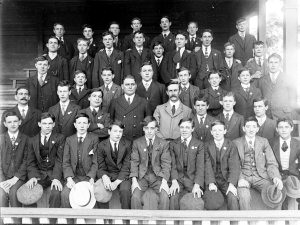Frank Leslie Reffell (1895 – 1931)
Before the start of the First World War, a youth migration scheme for boys existed administered by the South Australian Government. This sent 172 boys from the United Kingdom to become farm apprentices throughout the state of South Australia. For most of these boys it was the best possible chance that they would have to escape from an unfortunate start in life.
One of these boys was Frank Leslie Reffell who was born in the Southborough area of Tunbridge Wells. Neither he nor his sister Bessie knew who their father was. Frank was sponsored by the Kent Colonising Association, based in Tunbridge Wells and led by the the Reverend RL Gwynne. The Association had been formed around 1905 and had also sent apprentice farm boys to Canada and Tasmania. At 20 years old, he was a little older than most of the boys. Frank stated that he had worked on farms since he was 14, although his reference was from a shopkeeper. The passage cost of £7 was loaned by the South Australia government. This was to be repaid in monthly instalments from his future farm wages. He was also loaned £2 from the Kent Colonising Association for clothing.

Jubilee Oval behind the Exhibition Building, North Terrace, Adelaide.
Frank arrived in Australia aboard the SS Orsova on 11 June 1914. The photograph on the right shows the boys who arrived on that ship. It was taken behind the Exhibition Building at the Jubilee Oval, North Terrace, Adelaide. At present it is not possible to identify which one is Frank.
Frank Leslie was sent to farmer DN Martin at Pittenween Farm, near Kadina, northern Yorke Peninsula. He would have only been obliged to stay with the farmer for twelve months as he was too old to sign a three year contract. Because of his age he was not apprenticed under the 1913 Immigration Act and was not be liable for compulsory military training. The wages to be paid were 15/- rising to 30/-, although due to the economic conditions of the time he was paid less. This was despite farmer Martin stating that that Frank was settling in well, being able to milk and steadily improving in the saddle.
Unfortunately fame and fortune was not to be, Frank died of testicular cancer in Port Augusta hospital on 22 March 1931. He was buried in the cemetery there on the following day. The cemetery records show him as a labourer aged 36 and was single.
Sister Bessie stayed in the UK. She married William King of the Canadian Military Police in Seaford, later moving back to Tunbridge Wells. They had at least two children, although one is known to have died at a young age.
The above information is kindly based on the research carried out by Elspeth Grant for her PhD with the School of History & Politics at the University of Adelaide in South Australia.
The photograph is provided here by kind permission from the The History Trust of South Australia. Glass Negative Photographic Collection no. 1102.
Other research by John Reffell at the Surrey History Centre.